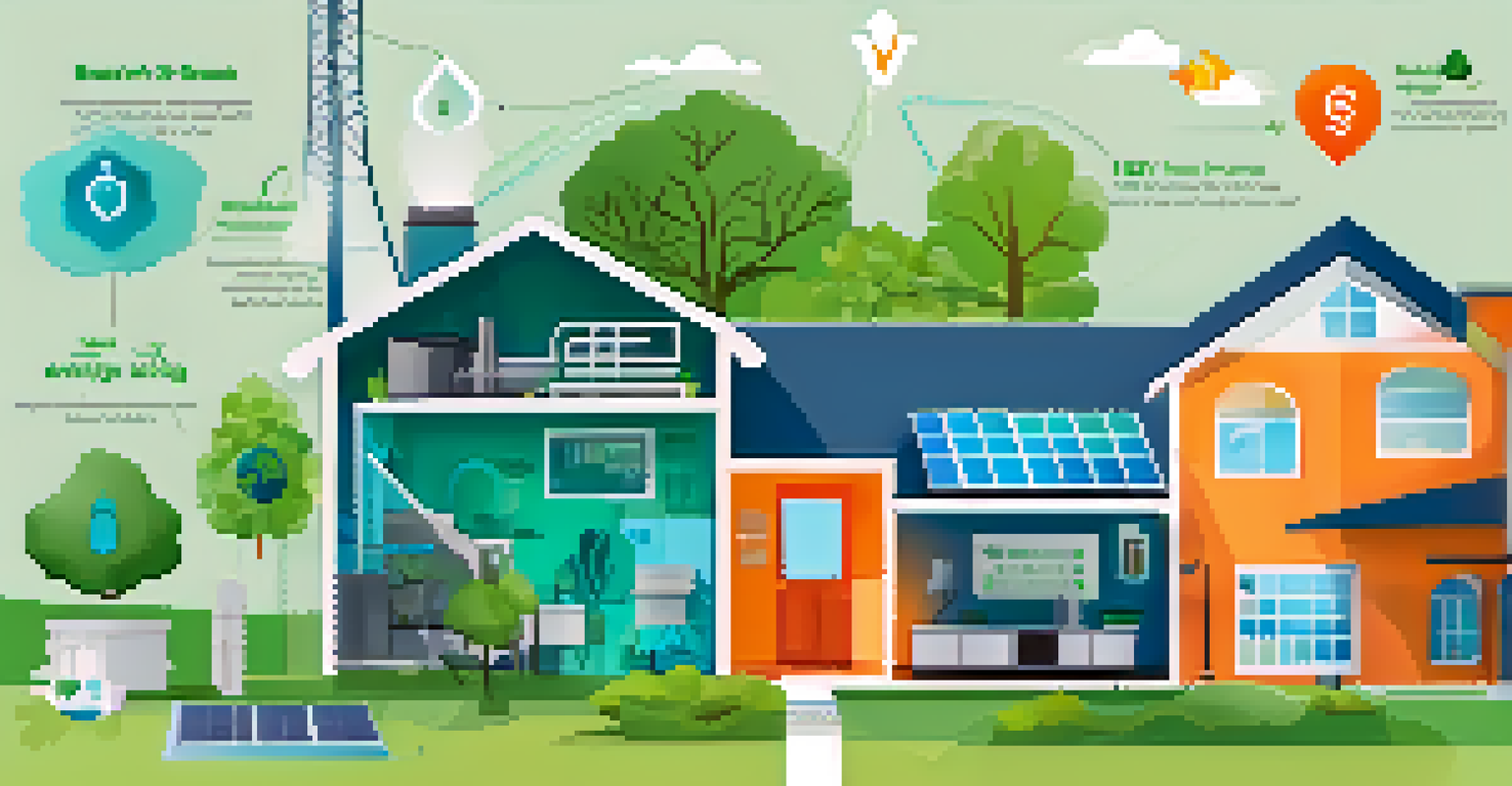The Benefits of Smart Home Energy Monitoring Systems

Understanding Smart Home Energy Monitoring Systems
Smart home energy monitoring systems are devices that track and manage your energy usage in real-time. They allow homeowners to see how much energy each appliance consumes, providing valuable insights into your energy habits. By understanding your usage patterns, you can make informed decisions about where to cut back and save money on your utility bills.
Energy conservation is the foundation of energy independence.
These systems typically connect to your home's Wi-Fi network and can be accessed via smartphone apps or web dashboards. This means you can monitor your energy consumption from anywhere, giving you the flexibility to manage your usage while you're at work or on vacation. Imagine being able to see which devices are hogging energy while you're away!
Moreover, many smart energy monitors can send alerts and recommendations based on your consumption data. For example, if your energy use spikes at a certain time, the system might suggest ways to reduce your consumption during peak hours, helping you to further optimize your energy usage.
Cost Savings with Energy Monitoring Systems
One of the most compelling benefits of smart home energy monitoring systems is their potential for cost savings. By gaining insights into your energy usage, you can identify areas where you might be overspending. For instance, if you discover that your old refrigerator is using significantly more energy than a newer model, investing in an upgrade could save you money in the long run.

Additionally, these systems often provide tips and suggestions for reducing energy waste. For instance, they might alert you to unplug devices that consume power even when turned off, a phenomenon known as phantom load. By making small adjustments based on these insights, you can quickly see a reduction in your energy bills.
Save Money with Energy Insights
Smart home energy monitoring systems help identify energy hogs, enabling homeowners to reduce utility bills through informed decisions.
In many cases, utility companies also offer rebates or discounts for homeowners who implement energy-saving technologies. By investing in a smart energy monitoring system, not only can you save money on your bills, but you might also qualify for these incentives, further enhancing your savings.
Increased Energy Efficiency at Home
Implementing a smart home energy monitoring system can significantly boost your home's energy efficiency. With real-time data, you can pinpoint which appliances are energy hogs and consider replacing or upgrading them. This proactive approach not only reduces energy consumption but also lowers your carbon footprint.
The future is green energy, sustainability, renewable energy.
Moreover, many of these systems allow you to set energy usage goals and track your progress over time. For example, if you aim to reduce your energy consumption by 20%, you can easily monitor your daily or weekly usage to see if you’re on track. This gamification of energy savings can be both motivating and rewarding.
As you become more aware of your energy consumption patterns, you may also find yourself adopting more energy-efficient habits. Simple changes, like turning off lights when leaving a room or using energy-efficient settings on appliances, can collectively lead to substantial energy savings.
Environmental Impact of Smart Energy Monitoring
Beyond personal savings, smart home energy monitoring systems contribute to a larger environmental impact. By reducing energy consumption, you help decrease the demand on power plants, which often rely on fossil fuels that emit greenhouse gases. Every small effort counts in the fight against climate change.
Many smart energy systems also provide insights into your carbon footprint, allowing you to see the effect of your energy choices in real-time. This awareness can inspire you to make more sustainable decisions, such as using renewable energy sources or adjusting your habits to favor greener options.
Boost Home Energy Efficiency
Implementing these systems allows users to track energy usage, adopt efficient habits, and set consumption goals for better efficiency.
Furthermore, as more homeowners adopt these technologies, there’s a collective impact on energy consumption patterns. This shift can lead to a demand for more sustainable energy solutions and innovations within the power sector, driving further environmental benefits.
Convenience and Control with Smart Systems
Smart home energy monitoring systems offer unmatched convenience and control over your energy usage. With remote access through mobile apps, you can monitor your home's energy consumption from anywhere, whether you're at the office or on vacation. This level of control allows you to make instant adjustments to appliances or settings as needed.
Additionally, many systems integrate with other smart home devices, creating a cohesive network that enhances your home's intelligence. For example, you can set your smart thermostat to adjust the temperature based on your energy usage, maximizing efficiency while ensuring comfort.
The ability to receive alerts about unusual energy consumption is another convenience. If a device is using more energy than usual, you can be notified immediately, allowing you to take action before it leads to a spike in your utility bill.
User-Friendly Interfaces and Insights
Modern smart home energy monitoring systems come equipped with user-friendly interfaces that make understanding your energy consumption straightforward. Most systems offer visual representations of your usage over time, making it easy to spot trends and identify areas for improvement. This simplicity encourages users to engage with their energy data regularly.
Many platforms also provide educational resources, helping users understand best practices for energy conservation. This educational approach demystifies the data, empowering you to make informed decisions about your energy usage.
Enhance Environmental Impact
By lowering energy consumption, smart monitoring systems contribute to reduced greenhouse gas emissions and promote sustainable energy practices.
Moreover, the ability to compare your energy usage against similar households can provide additional context. By seeing how your consumption stacks up, you can feel motivated to adopt more energy-efficient practices and contribute to a sustainable future.
Future Innovations in Energy Monitoring Technology
As technology continues to evolve, the future of smart home energy monitoring systems looks promising. Innovations such as artificial intelligence (AI) and machine learning are being integrated into these systems, allowing for even more personalized energy-saving recommendations. Imagine a system that learns your habits and automatically adjusts energy settings for maximum efficiency!
The integration of smart grids with home energy monitors is another exciting development. This technology will enable real-time communication between your home and the utility provider, optimizing energy consumption based on demand and supply fluctuations.

Finally, as renewable energy sources like solar gain traction, smart home energy systems will be crucial for managing these technologies. They can help homeowners track not just consumption, but also production, making it easier to harness and optimize renewable energy solutions in the home.